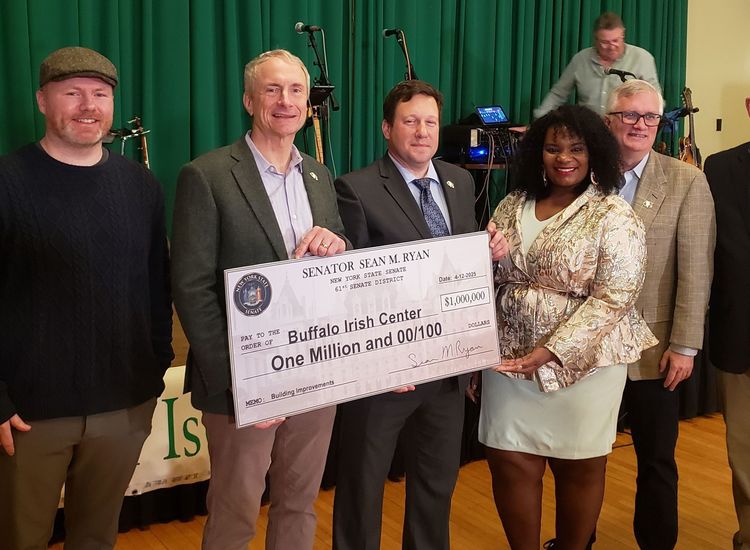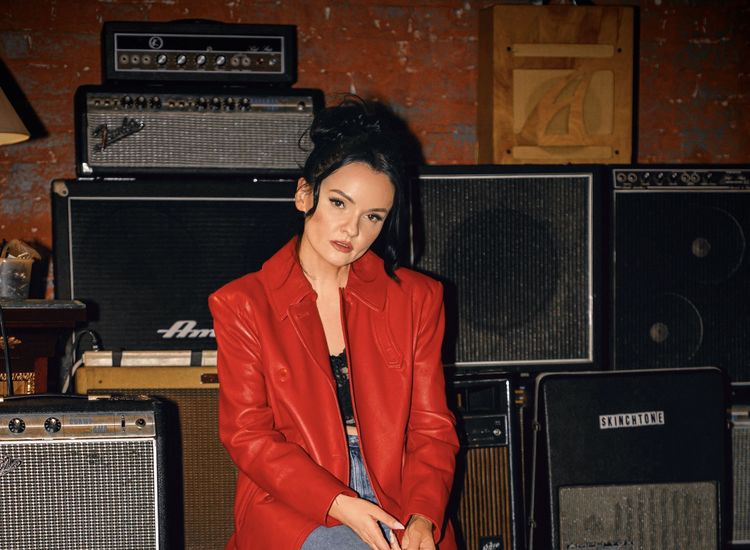Unofficially, it's summertime, and the living is--if not exactly easy--easier. A sure way to keep the creep of the summertime blues away is to play the fun-filled, self-issued, debut CD by the 16-member Washington Square Harp and Shamrock Orchestra. The album title alone indicates what's in store: "Since Maggie Dooley Learned the Hooley Hooley." It's a song co-written by Bert Kalmar, who put into the cinematic mouth of Groucho Marx the lyrics of "Whatever It Is, I'm Against It" in the film "Horse Feathers" and gave us "Hooray for Captain Spaulding" in the film "Animal Crackers."
With the exception of "Sweet Dublin Bay," a poignant ballad of immigration, all the songs on WSHSO's recording induce guaranteed smiles if not laughter.
With flair, Louise Sullivan sings the album'a title song about Maggie Dooley's culturally assimilative trip to Honolulu and the odd effect of it on her and her Cork neighbors after she returns home. The lines brim with picturesque humor: "The Sweeneys and Daileys have sold their shillelaghs and bought ukuleles to play" and "Every colleen on the street is all dressed up like shredded wheat since Maggie Dooley learned the hooley."
Mick Moloney, who founded the orchestra in 2000, sings "The Night Pat Murphy Died," previously made popular by the Flanagan Brothers, with all the hilarity this bibulous yarn contains. The notion of taking the ice off the corpse and using it to keep the beer cold, and later leaving the pub for the cemetery while leaving the corpse behind, follows a familiar trope of Irish comic drinking songs, soused in mortality, that Moloney and the rest of WSHSO mirthfully refreshen.
Donie Carroll expertly conveys the frivolity of the song "Arrah, Come In Out of the Rain, Barney McShane."
In "When Rafferty Brought the Rumba to the Town of Aughnacloy," recorded by the McNulty Family in 1937, Dan Neely, who oversees a popular Saturday session at Lillie's pub in NYC, risibly details the consternation of Aughnacloy, Tyrone, denizens over Rafferty's introduction of this exotic dance there.
What those four songs suggest is that well-crafted silliness can provide both relief and release, partly countervailing the all-too-real, profound tragedies inspiring Irish ballads of deprivation, no-choice immigration, broken hearts, and dashed dreams. It may be the reason why "Sweet Dublin Bay," compellingly sung by Liz Hanley with the aid of guest Ivan Goff's uilleann piping, breaks from the album's song pattern: to remind us of the seriousness of such subjects. "Anach Cuain," the tune attached to the song, only deepens the sense of loss.
Of the album's 11 tracks, six are instrumental medleys: a march and two sprightly barndances, "The Four Provinces / The Curlew Hills / If There Weren't Any Women in the World"; a selection of two waltzes, the first of which, "Dermot Grogan's Favorite," features Don Meade's evocative harmonica playing in tribute to his late session-mate; the jigs "The Humors of Lisheen / The House in the Glen / Art O'Keeffe's," containing a brief, tasty centerpiece of banjo and piano; the buoyantly played hornpipes "Rickett's / Kit O'Mahony's"; and the polkas "Padraig O'Keeffe's / Bill Malley's / Din Tarrant's" and the reels "Miss McGuinness / Tommy Peoples' / The Torn Jacket," two tracks any ceili or set dancer would find enticing.
The entire CD offers enjoyment both in the playing and in the listening. But it must also be pointed out that the tracks vary with the varying abilities of WSHSO's members. Not everyone here is or pretends to be an Irish-style virtuoso. Mick Moloney and flutist-ethnomusicologist Scott Spencer each mention in their CD essays that the Washington Square Harp and Shamrock Orchestra is a "community" band. This recording is as much about giving expression to the communal joy and friendship behind the music as it is about executing the music with bright arrangements and desired cohesion.
WSHSO's energy and commitment are obvious on the album. It is a delightful, perfectible document of a perfect premise for recording Irish music: to let listeners in on the fun. And it is, indisputably, f-u-n. As Mick Moloney noted in his album essay, "When we get together, there are always miles of smiles." With the advancing summer heat, think of this recording as a grin-and-tonic.
For more information about the Washington Square Harp and Shamrock Orchestra and their first album, including how to purchase it, visit http://wshso.wordpress.com or www.facebook.com/wshso.
The Johnstons to reunite for one night only
From Slane, Co. Meath, the siblings Adrienne, Lucy, and Michael Johnston formed a trio performing traditional and contemporary folk songs during the 1960s folk music revival sweeping through Ireland, Britain, and America. Later, the trio was joined by current WSHSO member Mick Moloney from Castletroy, Limerick, and, when Michael Johnston left, Paul Brady of Strabane, Tyrone.
The Johnstons' first No. 1 hit on Ireland's pop charts was a cover of Ewan MacColl's "The Traveling People," and from 1968 to 1972 the group released six albums (plus "The Johnstons Sampler") and six singles. In 1969, after the first three albums for the Transatlantic label, Lucy departed, and in 1971 Mick Moloney left. The remaining duo of Adrienne Johnston and Paul Brady recorded the last album under the Johnstons' name: "If I Sang My Song." Then they, too, decided to pursue separate musical paths.
The enduring legacy of the Johnstons is the way they broadened the palette of possibilities for Irish music. That ranged from close-harmony renditions of the traditional songs in Irish "Fear a' Bhata" and "Fuigfidh Mise 'n Baile Seo" to contemporary folk songs such as Leonard Cohen's "Hey, That's No Way to Say Goodbye," Gordon Lightfoot's "Bitter Green," and Joni Mitchell's "Urge for Going" and "Both Sides Now." (Judy Collins's hit cover of "Both Sides Now" in 1968 probably undercut a potential Johnstons's hit in the U.S. with the same song.) The influence of the Johnstons' instrumental tracks, especially Moloney and Brady's skillful version of "O'Carolan's Concerto" in 1968, also deserves noting.
In 1981, Adrienne Johnston died tragically, forever foreclosing on the chance of the original trio or full early quartet getting together again. But the spirit of the group will be rekindled at the Johnstons Reunion Concert, marking the 30th anniversary of Adrienne's death. Expected to be a sellout, the concert will take place at 8 p.m., Sat., June 25, in the 900-seat TLT Concert Hall and Theatre, East Coast Business Park, Matthews Lane, Drogheda, Co. Louth, Ireland. There, Lucy and Michael Johnston, Mick Moloney, Paul Brady, and special guest Niamh Parsons, representing Adrienne Johnston, will together perform the repertoire of the Johnstons from 40 years ago. Drogheda-born singer Sean Corcoran will be the emcee.
For tickets or further information, contact the TLT at 011-353-41-987-8560 or info@thetlt.ie. You can also visit www.thejohnstonsmusicfestival.com for additional events.
ROAM tour
In stark contrast to the partially dichotomous audience attending the 1988 Carnegie Hall concert I wrote about in last week's column, the capacity audiences for the dozen concerts of the "Roots of American Music" (apt acronym of ROAM) tour this month reveled in Irish, African, and Blue Ridge Mountain music, according to Limerick-born, Manhattan resident singer and multi-instrumentalist Mick Moloney, a tour member who phoned me from the road in southwest Virginia.
The other 11 ROAM members were Southern California uilleann piper and bodhran player Joey Abarta, Lonesome River Band bluegrass banjoist and guitarist Sammy Shelor, third-generation Carter Family singer, guitarist, and autoharpist Dale Jett, Mali griot Cheick Hamala Diabate, Virginia singer, guitarist, banjoist, autoharpist, and flatfoot dancer Eddie Bond, Round Peak banjoist, guitarist, and fiddler Kirk Sutphin, Big Stone Gap singer Molly Slemp, Virginia gospel singer and bassist Linda Lay, Virginia singer and drop-thumb banjo player Burl Rhea, Virginia singer, guitarist, and luthier Wayne Henderson, and Virginia singer, guitarist, and banjoist Leigh Beamer.
Conceived and organized by 73-year-old Joe Wilson, who retired in 2004 after 28 years as executive director of the National Council for the Traditional Arts, this "Roots of American Music" tour dipped into a rural southwest Virginia sound formed from the music of the Ulster Irish, Rhine Valley Germans, Africans, Blue Ridge mountain denizens, and others there after 1720. "Roots of American Music" is also the name of an exhibit at the 17,000-square-foot Blue Ridge Music Center overseen by Joe Wilson in Galax, Va.
Moloney told me he was having a ball, and gave me this heads-up: 15-year-old Leigh Beamer has the talent to reach an Alison Krauss-like level of recognition.










